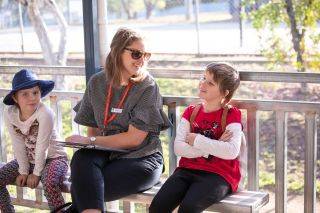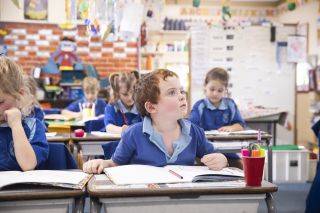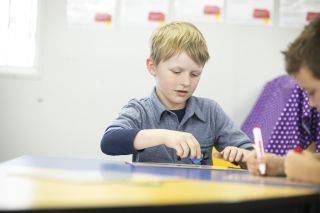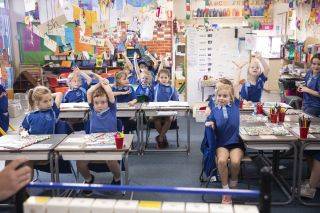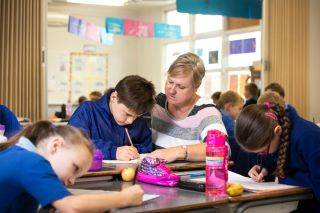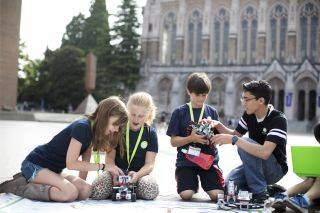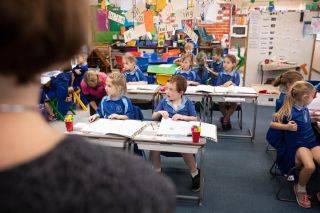Teaching practice categories
Latest releases
Latest releases

Respond constructively to student behaviour (Secondary)
TEACHING PRACTICE
For student years
Helps students to
- build self-esteem
- stay on task

Provide a safe calm space for students (Secondary)
TEACHING PRACTICE
For student years
Helps students to
- learn self-regulation
- reduce behavioural dysregulation

Strengthen school belonging and emotional trust (Secondary)
TEACHING PRACTICE
For student years
Helps students to
- feel connected
- feel valued
Classroom management
Classroom management
Effective classroom management is essential in creating positive learning environment for all students with minimal disruptive behaviours. Research suggests that students with diverse learning needs, including students on the autism spectrum, benefit from structured teaching and environments that cater to their sensory needs. The practices in these series provides teachers with tools and techniques create calmer classrooms that are accessible and engaging to diverse learners.

Use visual schedules
TEACHING PRACTICE
For student years
Helps students to
- transition smoothly
- understand expectations
- learn new concepts

Organise your classroom
TEACHING PRACTICE
For student years
Helps students to
- access all classroom areas
- transition smoothly

Establish classroom rules
TEACHING PRACTICE
For student years
Helps students to
- know what is expected
- understand consequences
Sensory considerations
Sensory considerations

Meet students' sensory needs
TEACHING PRACTICE
For student years
Helps students to
- engage in tasks
- self-regulate

Understanding and supporting comprehension
TEACHING PRACTICE
For student years
Helps students to
- engage in learning

Provide a safe calm space for students (Secondary)
TEACHING PRACTICE
For student years
Helps students to
- learn self-regulation
- reduce behavioural dysregulation
Career and self-discovery
Career and self-discovery
Developing a career or training pathway after school often requires thinking about how these prospects link with personal strengths and interests. Supporting students to discover these strengths and interests will give them a solid foundation for their career journey. These career and self-discovery practices focus on how to use the myWAY Employability platform, explore career interests and strengths, and identify and plan for post-school pathways.

Introduction to myWAY Employability
TEACHING PRACTICE
For student years
Helps students to
- explore a range of careers
- use myWAY Employability

Self-discovery
TEACHING PRACTICE
For student years
Helps students to
- identify work-related strengths
- discover career interests
- identify workplace preferences

Work discovery
TEACHING PRACTICE
For student years
Helps students to
- discover training pathways
- explore work experience
Adjustments and scaffolds
Adjustments and scaffolds
Inclusive teaching often requires adjustments and scaffolds to be implemented to meet the needs of every learner. Small changes can support a student to understand the learning content. Adjustments and scaffolds may also reduce anxiety and behavioural concerns. These adjustments and scaffolds practices focus on strategies that can support students with transitions, writing, and general learning behaviour.

Use visual self-management tools
TEACHING PRACTICE
For student years
Helps students to
- build greater independence
- maintain on-task behaviour

Understanding and supporting comprehension
TEACHING PRACTICE
For student years
Helps students to
- engage in learning

Use instructional sequences
TEACHING PRACTICE
For student years
Helps students to
- transition smoothly
- know what to expect
Social/emotional wellbeing
Social/emotional wellbeing
The social and emotional wellbeing of students can strongly impact learning outcomes. Many diverse learners can find social activities challenging. These social and emotional wellbeing practices focus on social skill development, regulating emotions, and coping strategies for an overwhelmed state.

Teach self-regulation
TEACHING PRACTICE
For student years
Helps students to
- regulate their feelings
- regulate their behaviour

Provide feedback on learning & behaviour
TEACHING PRACTICE
For student years
Helps students to
- stay motivated
- remain on-task for longer
- feel valued

Model emotional literacy
TEACHING PRACTICE
For student years
Helps students to
- identify and respond to emotions
- regulate emotions
School connectedness
School connectedness
Students who feel a greater sense of school connectedness experience increased self-esteem, motivation and academic achievement. Fostering school connectedness also develops an inclusive learning environment. These school connectedness practices focus on developing home-school relations, collaborative partnerships, and establishing trust through communication.

Share information through home–school communication
TEACHING PRACTICE
For student years
Helps students to
- be supported across settings

Foster school connectedness using the WISE model
TEACHING PRACTICE
For student years
Helps students to
- increase self-esteem
- improve resilience
- increase school connectedness

Strengthen school belonging and emotional trust
TEACHING PRACTICE
For student years
Helps students to
- feel connected
- feel valued
Behavioural support
Behavioural support
Unexpected behaviours are often the first sign that students are experiencing emotional overwhelm. While adjustments and scaffolds put in place can lessen the possibility of these behaviours, these moments can also be a great learning experience if addressed sensitively. These behavioural support practices focus on how to coach students through these experiences, and how teachers can respond constructively.

Respond constructively to student behaviour
TEACHING PRACTICE
For student years
Helps students to
- build self-esteem
- stay on task

Respond constructively to student behaviour (Secondary)
TEACHING PRACTICE
For student years
Helps students to
- build self-esteem
- stay on task

Supporting students to detect their own emotions from body clues
TEACHING PRACTICE
For student years
Helps students to
- recognise body clues
- identify emotions
Whole-of-school strategies
Whole-of-school strategies
School leaders understand that an inclusive school culture requires clear communication, respect, openness, fairness, and accountability. These strategies support a whole-school approach to developing and maintaining an inclusive culture that will benefit your entire school community.

Using UDL in planning
TEACHING PRACTICE
For student years
Helps students to
- engage in learning
- improve learning outcomes

Working in partnership: Relationships, shared goals and communication
TEACHING PRACTICE
For student years
Helps students to
- participate in inclusive culture
- feel supported

Establish collaborative partnerships - Collaborative Partnerships in Action
TEACHING PRACTICE
For student years
Helps students to
- feel connected
- develop positive relationships
Robotics
Robotics

Communicate effectively: Robotics social clubs
TEACHING PRACTICE
For student years
Helps students to
- collaborate
- express ideas

Negotiate, resolve conflicts: Robotics social clubs
TEACHING PRACTICE
For student years
Helps students to
- suggest solutions
- compromise

Improve teamwork skills: Robotics social clubs
TEACHING PRACTICE
For student years
Helps students to
- collaborate
- express ideas
- compromise

